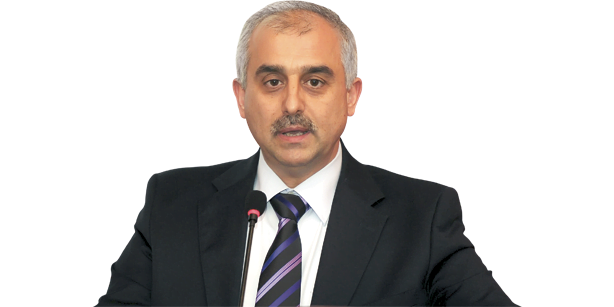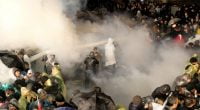A useful guide to understanding the Hizmet-AK Party tension

Date posted: December 31, 2013
İSTANBUL
Mustafa Yeşil, head of the Journalists and Writers Foundation (GYV), of which Fethullah Gülen is honorary president, talks about the reasons for the increasing tension between the ruling Justice and Development Party (AK Party) government and the Hizmet movement, which conducts praiseworthy activities in Turkey and around the globe with inspiration from well-respected Turkish-Islamic scholar Gülen.
Yeşil responded to some criticisms of the Hizmet movement as follows.
The Hizmet movement is part of civil society
What is the overall perspective of the Hizmet movement on politics and political parties?
The Hizmet movement is a civil society organization (CSO) and aims to serve all human beings in the pursuit of God’s good pleasure. It does not treat cultural or religious differences as areas for conflict. Its activities are performed by volunteers.
This movement has never nurtured political aims, stances or programs. The Hizmet movement has always kept its distance from all political parties.
The Hizmet movement has never lent, or urged its base to lend, collective support to any political party. This is so that the adherents of the Hizmet movement can express diverse political tendencies. In other words, the Hizmet movement does not meddle with the political choices its adherents might make in elections.
The AK Party changed after taking control of the state apparatus
How were relations between the Hizmet movement and the AK Party in the past? Why is there a rift now?
When the AK Party came to power in 2002, Turkey was under intense pressure from the military tutelage regime.
The AK Party had promised that it would promote democratic values, greater conciliation, a pluralistic approach, rights and freedoms, serious change and also amend the Constitution created by the coup perpetrators.
Actually, these were Turkey’s basic needs. In the final analysis, the AK Party took significant steps from 2002 to 2010 and achieved significant success in the fight against the tutelage regime by amending 26 articles of the Constitution through the referendum held in 2010, throwing its support behind the Ergenekon and Balyoz trials and introducing comprehensive reforms.
However, after getting rid of the tutelage regime completely in 2010 and gaining total control of the state apparatus, the AK Party started to falter and slow down in the democratization process. We see that problems have emerged in terms of human rights and freedoms. In parallel with this, the Hizmet movement’s support for the government has started to fall.
People are seriously concerned
What developments might we see in politics in upcoming months?
Surveys suggested that the AK Party had largely maintained its electoral voters, but given the fact that the AK Party has recently distanced itself from a pluralistic approach and abandoned its rhetoric of embracing everyone, its appeal to the broad and diverse masses will certainly decline.
In particular, the AK Party’s approach to exam preparatory schools has shocked its voter base, triggering concerns about antidemocratic practices, as the party has offered no reasonable explanation for its plan to shut down these prep schools. If this is not redressed, it may spell a serious problem for the AK Party in the upcoming elections.
Meanwhile, the AK Party seems to be in panic about the recently exposed corruption claims. As you know, it quickly sacked around 135 police chiefs in the wake of the corruption probe and also meddled in the functioning of the judicial process. This raises serious questions and concerns among the public.
It is true that three ministers who were charged in the probe have resigned. But the one-week delay in their resignations has certainly created suspicions in the minds of many people. We will have to wait and see how this will affect the elections.
Why did the AK Party insist on closing down the prep schools without offering a reasonable solution? What was the main reason for the disagreement between the AK Party and the Hizmet movement on this issue? Is there more to the prep schools debate?
The prime minister said he had been planning to shut down the prep schools since he came to power. He said he had announced his intention to close the prep schools in 2002 or 2003.
But 10 years have passed since 2003, and in this time the government could have developed solutions to the problems in the country’s education system. It could have redesigned the system. However, during this time, we have seen five different education ministers. Each of them introduced different practices in education. But none of them made any resolute move to tackle the prep schools issue. Finally, the current education minister, Nabi Avcı, was instructed by the prime minister to proceed with the plan to shut down the prep schools, but the public couldn’t make any sense of the government’s insistence to proceed with the plan, considering the lack of preparation.
In appearance, the government was merely seeking to shut down the prep schools. However, its insistence on proceeding with the plan without solving the fundamental problems of the education system has led to two questions. First, was the government trying to teach the Hizmet movement a lesson by shutting down the prep schools, as a significant proportion of the prep schools are run by the movement?
Second, was Turkey shedding its democratic achievements, as the insistence on shutting down prep schools without listening to the mounting public reaction implied a stronger antidemocratic stance? It would be wrong to make such assessments by focusing solely on prep schools.
Gülen was against the climate of war created by the Mavi Marmara campaign
Is there a dispute between the Hizmet movement and the AK Party regarding the Mavi Marmara incident and the overall Middle Eastern policy? What do you say about the claim that the Hizmet movement is aligned with the US and Israel?
The Hizmet movement has always refrained from violence and promoted positive action, in full compliance with the law, for about 60 years since its establishment. It has never approved of conflicts. It has suggested that problems can be solved through dialogue and conciliation, and it has built its philosophy on this mentality.
As for the Mavi Marmara incident — the Israeli attack on a Gaza-bound aid flotilla that left nine Turkish citizens dead in 2010 — it is a praiseworthy effort to take humanitarian aid to poverty-stricken Gazans. However, this campaign created a tense and risky climate, and indeed, some AK Party deputies who were planning to join the expedition gave up at the last minute.
Israel’s inhuman practices may be criticized, and the activities of Israel or its problems with Palestinians may be discussed in different ways. The campaign ended in tragic events. Nine Turkish citizens died because of the unfair intervention by Israel in international waters, and Gülen expressed his condolences, referring to the dead people as “martyrs.” Although this incident strained Turkish-Israeli relations, the Turkish and Israeli governments have always been in contact to overcome the crisis, and eventually, after the intervention of US President Barack Obama, Israel made an apology to Turkey. However, the issue of how to compensate for the losses and casualties is still being debated between the two countries.
At that time, Gülen said that humanitarian aid should be taken to Gaza without triggering any conflict. This problem could be solved through diplomatic means and without causing any row. However, when Gülen voiced his views, his words were distorted and he was misquoted to give the impression that he was suggesting that Israel’s authority should be accepted. However, Gülen intended to say that humanitarian aid must be taken to Gaza, but without creating a conflict or row. Indeed, if you intend to help with a humanitarian aid initiative, you shouldn’t create new conflicts.
Actually, in retrospect, we see that the type of behavior Gülen criticized led to the deaths of nine Turkish citizens.
For a long time, certain “deep” networks within the state have sought to discredit the Hizmet movement in the eyes of the public. Now, it is a gross act of unfairness and heinous slander for certain religious groups to try to raise suspicions about the independence of the Hizmet movement and its loyalty to Islam and Turkey by referring to Gülen’s criticisms of the Mavi Marmara campaign.
Independence, internally and externally, is the Hizmet movement’s strongest quality
As for the Hizmet movement’s stance on the US and Israel, the Hizmet movement is a civilian movement. It develops and implements programs and projects with CSOs, academic communities and organizations, educational institutions and other civilian networks in many countries around the world.
One of these countries is the US. We plan to establish contact with CSOs in Israel, but so far we haven’t taken steps to cooperate with any Israeli CSO on any project. In particular, we are aware of the potential for educational activities in Palestine, but we haven’t managed to take concrete steps on this due to the turmoil and chaos in the region.
The Hizmet movement has never been controlled by any country or organization in Turkey. The Hizmet movement is an independent movement. It is not controlled or guided by any foreign state. The Hizmet movement is completely independent and autonomous in terms of its resources, projects and stance, and this independence is its distinguishing characteristic.
The MİT crisis is an excuse for purges
What can you say about claims that the Hizmet movement attempted to overthrow the AK Party during the National Intelligence Organization (MİT) crisis of Feb. 7?
I think people are not properly informed about this claim. The pro-government sources and media outlets opted to perceive and portray the MİT crisis as something targeting the prime minister, but this perspective distorts the facts. Indeed, the prosecutors’ move to question certain MİT members was part of the police operation against the Kurdistan Communities Union (KCK), and the prime minister was behind those operations.
During their questioning, the prosecutors found that certain MİT members had engaged in terrorist attacks launched by the KCK. So, they wanted to ask MİT chief Hakan Fidan about these MİT members, and they requested that he testify at the prosecutor’s office, but he refused to comply with the request. Eventually the prosecutors had to resort to certain legal measures to question him.
As you know, a chief public prosecutor cannot arrest a prime minister or remove him from office via an indictment. Indeed, prime ministers or deputies cannot be removed from office or tried without Parliament’s approval.
So what is the intention behind this distortion of the facts? I think this has been brought to our attention as an excuse for the purging of certain bureaucrats.
Parallel state accusations are unfounded and unlawful
What do you think about the accusation that the Hizmet movement has established a “parallel state”?
Only a network organized with the intention of pursuing and attaining certain goals, nested within the government, can be appropriately described as a parallel state or gang. The Hizmet movement is a civil organization that aims to advocate peace across the world, perform service for humankind and promote Turkey in the international arena, and it conducts its activities through volunteers.
Of course, those following the Hizmet movement may include bureaucrats or public servants at varying levels of seniority. These people’s sympathy for the Hizmet movement’s mission is one thing, but their pursuance of different goals within the state apparatus, as a distinct network, is another. In the past similar accusations have been made about Gülen, and he was tried on the charge of running a parallel state network from 1999 to 2008, when the tutelage regime was at its peak, but he was acquitted of those charges. If, during this nine-year trial, the slightest evidence had been found in the investigations by the prosecution, the court would not have acquitted Gülen.
How could a parallel state which couldn’t be detected in 2008 emerge after 2008, out of the blue? Moreover, the prime minister was not freshly introduced to the bureaucracy in the last year, when the claims of the parallel state began to be voiced. This government has been working with those bureaucrats for around 10 years. If there were such a network, it would have been detected by now.
Efforts to discredit the graft probe by saying the Hizmet movement is behind it
What is your perspective on the latest graft probe? What do you think about the “Hizmet movement’s role” or the “involvement of external powers” in the police operations?
The recent corruption scandal is like past cases. As a matter of fact, the corruption was uncovered as a result of an investigation that lasted for one or two years. Just like some smear campaigns targeting the Hizmet movement in the past, certain media figures rushed to reheat similar charges as soon as the graft probe was exposed. As you will remember, in an effort to discredit the charges against Ergenekon members — a clandestine organization nested within the state, trying to overthrow or manipulate the democratically elected government — and perpetrators of the Balyoz coup plan — devised in 2003 with the aim of unseating the AK Party government through violent acts — some groups had tried to link the police officers, prosecutors and judges involved in these trials to the Hizmet movement. Similarly, there are efforts to discredit the recent graft probe by saying the Hizmet movement is behind it.
The Hizmet movement is a civilian movement. It does not have a police force or judiciary. All police officers are subordinate to the government. Likewise, the judiciary, including the Supreme Board of Judges and Prosecutors (HSYK), is open to control and review by the government. It is an urban legend to suggest that a civil organization is behind these operations. No concrete evidence about its involvement has been produced so far. Not a single lawsuit has been launched for that reason.
Government’s approach to the graft probe raises suspicions in people’s minds
Currently the corruption claims are being investigated. The government is supposed to make clear that it will ensure the perpetrators of the corruption are prosecuted and penalized. The ruling party is responsible for protecting the rights of the public, and the mandate they receive from their voters requires this.
Accordingly, although it is supposed to take measures to protect the rights of the people, the government chose to remove around 135 police chiefs from office, including those who had launched the initial operation, appoint new prosecutors to the graft probe, amend certain laws and regulations and introduce restrictions on the press, curtailing the freedom of information, which fomented concerns about potential efforts to cover up the investigation.
Four ministers implicated in the corruption probe resigned one week after the police operation was launched, and the government’s failure to facilitate the police department and judiciary’s duty to investigate the corruption claims has made the government’s stance on the corruption questionable.
What will happen next? With the resignation of four ministers, the prime minister gave the impression that he will combat corruption. We hope he will deal with this matter resolutely and ensure that the AK Party is cleansed of corrupt politicians so that it can emerge as a clean and reliable party.
The graft probe is not politically motivated. It is not a conspiracy devised by the Hizmet movement to target the AK Party.
Are the corruption operations ideologically motivated, as the AK Party suggests?
The AK Party’s initial reaction sought to paint the judicial investigation as an ideological one. Certain pro-government media outlets tried to connect this operation to the Hizmet movement, and they came up with some connections. None of these connections are based on solid argument or concrete evidence.
As for the Hizmet movement, it has never been involved in any plan seeking to divide or weaken the AK Party, strip the AK Party of Recep Tayyip Erdoğan or engineer the political scene. It has not, does not and will not pursue such a goal.
The AK Party’s credibility has become questionable
What do you think about the measures to obstruct the graft investigations?
These measures raise concerns and undermine the credibility the AK Party has gained in its 10 years in office, and they diminish the sympathy many people feel toward the AK Party. We cannot understand why the AK Party is acting with such panic. Why did it reshuffle around 130 police chiefs? Why can’t it rely on the judiciary? Indeed, when referring to the Ergenekon and Balyoz trials, the prime minister had praised the police department and the judiciary.
Yet, the police department and the judiciary are the same now. The ruling party’s actions towards the corruption claims raises concerns about its credibility and trustworthiness.
The AK Party fears the probe may be expanded
What do you think are the reasons behind the AK Party’s choice to block the graft probe? What will be the consequences of this attitude?
The involvement of high-profile AK Party politicians in the corruption may have created serious concerns. The AK Party may have become worried about the corruption probe going deeper, which triggered panic.
Some AK Party members may be worried about external powers launching an operation to unseat the government, as the AK Party has been suggesting.
But if the AK Party fails to show a resolute stance, ensuring that the graft probe is conducted without intervention, this may seriously undermine public confidence in the AK Party, and this is certainly a problem for the AK Party in the run up to three critical elections.
Conditional curse is also in the Quran
Gülen’s “conditional curse” (mülaane) was misinterpreted. Do you have any remark to make on this?
Gülen has never cursed any person because of any persecution to which he has been subjected. Regarding the breach of his personal rights, he always notes: “Those who persecuted me or did wrong to me or hurt me should know that I forgive them for what they have done. But the breach of the rights of the public will be dealt with by God, and I don’t have any option but to forgive them.” The conditional curse voiced by Gülen is from verse 61 of the sura Al Imran in the Quran, as well as in another verse.
Why did Gülen feel the need to say it? After the graft probe was launched, some groups insistently claimed that it was Gülen who had pressed the button for the operation. Gülen’s lawyer made a public statement denying the accusations, but it wasn’t enough. Although Gülen said: “Such a form of conduct does not befit us, as we are solely concerned with the peace, happiness and coexistence of people. It is the duty of the state authority to deal with such matters,” certain media outlets persistently continued to blame the Hizmet movement for orchestrating the operation.
Gülen didn’t curse; he challenged those who were telling lies
In the face of this carelessness, Gülen was forced to say: “If those who go after these negative things… I don’t know who they are… have done things that are contrary to the spirit of the religion… and they’re counting us in, so that I will also refer to us… if they have done things that are contrary to the spirit of the religion, if things they have done are contrary to the fundamental disciplines of the Quran, if it is against the teachings of the Prophet Muhammad, if it is against Islamic law, against modern law, against the accepted rules of democracy today… then may God bury us and them in the earth, bring fire to their houses, ruin their homes. May God destroy them with his Name, Qahhar.”
Then, he continued, referring to those who accused him of conspiring against the government, “If you have evidence about my involvement, then say the same curse against those who are telling lies.” Therefore, this is a conditional curse by which God’s wrath is invoked against those who deliberately tell lies. It is unfair to say that this is a curse against Muslims. Rather, Gülen reaffirms his position, announcing that he has no involvement in the ongoing investigation. Despite this, certain media outlets distorted his words, saying: “Gülen cursed the AK Party. He cursed believers.”
Gülen is very sensitive about the use of public property
Can you analyze Gülen’s stance on the corruption claims?
Gülen has high religious sensitivities. During his life, he has been painstakingly careful about the use of public property. For instance, we know that he didn’t use a paper from public property for personal matters when he was doing his compulsory service in the army. He has repeatedly underlined that it is the duty of Muslims to pay the utmost care to the use of public property.
He generally stays in buildings that belong to foundations (wakf) that were set up for public benefit. In such places, he either does not eat or drink anything or pays the price of what he eats or drinks, and he pays the rent for his stay.
Of course, ruling parties and administrators must be extremely sensitive about how public resources are used. This is what the laws entail. This is what honest people are supposed to do. This is what Islam preaches. This is what the principles Islam introduces about the rights of other people tell us to do.
The Hizmet movement has never collaborated with the AK Party for material benefit
What factors are involved in the break-up of the alliance between the Hizmet movement and the AK Party?
The Hizmet movement never sought material benefits during the time in which it backed the AK Party. It never sought to derive benefits from public tenders, and it has never received material benefits from the AK Party.
The Hizmet movement’s sole intention has been to promote the country’s development, democratization and welfare and human rights and freedoms. As long as the AK Party continued to promote these values, the Hizmet movement backed the party. However, as the party started to exhibit a reluctance to push democratization forward, the sphere of human rights and freedoms started to diminish and the government started to alienate people and groups, serious problems emerged.
Source: Today's Zaman , December 31, 2013
Tags: Democracy | Fethullah Gulen | Hizmet (Gulen) movement | Turkey |
























